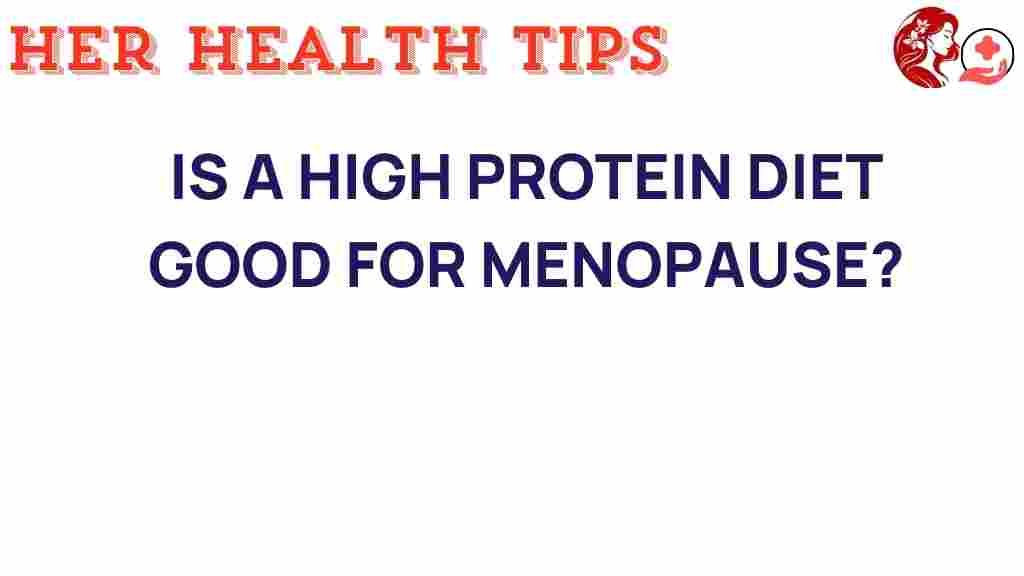Unlocking the Secrets: Is a High Protein Diet Beneficial for Menopause?
Menopause is a natural phase in a woman’s life that comes with various physical and emotional changes. As women transition through this stage, they often seek ways to maintain their health and wellbeing. One dietary approach that has gained attention is the high protein diet. This article explores the benefits of a high protein diet during menopause, its impact on nutrition and women’s health, and how it can help with hormone balance and overall wellness.
Understanding Menopause and Its Challenges
Menopause marks the end of a woman’s reproductive years, usually occurring between the ages of 45 and 55. Common symptoms include:
- Hot flashes
- Night sweats
- Mood swings
- Weight gain
- Insomnia
These symptoms can significantly affect a woman’s quality of life. Many women turn to dietary changes to alleviate these challenges and improve their health during this transition.
The Role of Nutrition in Menopause
Nutrition plays a crucial role in managing menopause symptoms. A well-balanced diet can help mitigate weight gain, support hormone balance, and improve overall wellness. Among the various dietary options, a high protein diet stands out due to its numerous benefits.
Benefits of a High Protein Diet During Menopause
A high protein diet can provide significant advantages for women experiencing menopause. Here are some key benefits:
1. Supports Muscle Mass Maintenance
As women age, they naturally lose muscle mass, a process known as sarcopenia. A high protein intake can help combat this loss by:
- Promoting muscle repair and growth
- Enhancing strength and physical function
Incorporating protein-rich foods can help preserve muscle, which is essential for maintaining metabolism and overall health.
2. Aids in Weight Management
Weight gain is a common concern during menopause due to hormonal changes that affect metabolism. A high protein diet can assist in weight management by:
- Increasing satiety, making you feel fuller for longer
- Boosting calorie burn through the thermic effect of food (TEF)
By including more protein in your diet, you can reduce cravings and manage your weight more effectively.
3. Enhances Mood and Cognitive Function
Protein is essential for neurotransmitter production, which influences mood and cognitive function. A diet rich in protein can help improve:
- Concentration
- Memory
- Overall mood stability
These improvements can be particularly beneficial as fluctuating hormones during menopause can lead to emotional instability.
4. Supports Bone Health
Osteoporosis is a significant concern for women post-menopause. A high protein diet can contribute to bone health by:
- Providing essential amino acids for bone density
- Enhancing calcium absorption
Including adequate protein can help strengthen bones and reduce the risk of fractures.
5. Promotes Hormone Balance
Maintaining hormone balance is crucial during menopause. A high protein intake can support this balance by:
- Regulating insulin levels
- Supporting thyroid function
These factors can help alleviate some of the symptoms associated with menopause.
How to Incorporate a High Protein Diet
Making dietary changes can seem daunting, but incorporating a high protein diet into your lifestyle can be a smooth transition. Here’s a step-by-step process to get you started:
Step 1: Identify Protein Sources
Begin by identifying high-quality protein sources that you enjoy. Some excellent choices include:
- Lean meats (chicken, turkey, lean beef)
- Fish and seafood (salmon, tuna, shrimp)
- Dairy products (Greek yogurt, cottage cheese)
- Plant-based sources (lentils, chickpeas, quinoa, tofu)
- Nuts and seeds (almonds, chia seeds, hemp seeds)
Step 2: Plan Your Meals
Once you’ve identified your protein sources, start planning your meals. Ensure that each meal contains a good portion of protein. Here are some meal ideas:
- Breakfast: Greek yogurt with berries and nuts
- Lunch: Grilled chicken salad with mixed greens and chickpeas
- Dinner: Baked salmon with quinoa and steamed broccoli
- Snacks: Hummus with carrot sticks or a protein smoothie
Step 3: Monitor Your Intake
Keep track of your protein intake to ensure you’re meeting your goals. Aim for a daily protein intake of:
- 1.2 to 2.0 grams of protein per kilogram of body weight, depending on your activity level
Using apps or food diaries can help you stay on track.
Step 4: Adjust Gradually
Make adjustments to your diet gradually. Start by increasing your protein intake by adding an extra serving of protein to one meal per day, then gradually increase it as you feel comfortable.
Step 5: Consult a Nutritionist
If you’re unsure about how to create a balanced high protein diet for your needs, consider consulting a nutritionist. They can provide personalized guidance based on your health status and goals.
Troubleshooting Common Challenges
Transitioning to a high protein diet may come with challenges. Here are some common issues and tips for overcoming them:
Lack of Variety
If you find yourself getting bored with your meals, try:
- Experimenting with new recipes
- Incorporating different cuisines
- Exploring various protein sources
Digestive Issues
Some people may experience digestive discomfort when increasing protein intake. To mitigate this:
- Introduce protein gradually
- Stay hydrated
- Incorporate fiber-rich foods
Cost Concerns
High-quality protein sources can be expensive. To manage costs:
- Buy in bulk
- Choose less expensive cuts of meat
- Utilize plant-based proteins
Conclusion
Embracing a high protein diet during menopause can significantly enhance women’s health by supporting muscle mass, aiding weight management, and promoting hormone balance. By making informed dietary changes, women can experience improved wellness during this transformative phase of life.
Whether you’re just starting or looking to refine your approach, remember that small changes can lead to significant benefits. For more resources and tips on nutrition and wellness during menopause, check out this comprehensive guide. Also, consider connecting with a professional for personalized advice tailored to your unique needs.
Ultimately, prioritizing nutrition is a powerful step toward navigating menopause with confidence and grace. Start your journey to health today!
This article is in the category Nutrition and created by HerHealthTips Team
